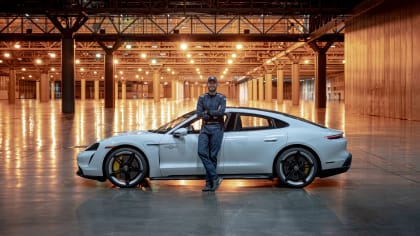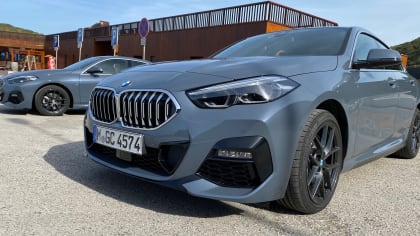New California Driving Laws for 2024

Here We Go Again - A new year means new driving laws
New laws and law-changes that affect drivers, bicyclists, and even pedestrians here in the Golden State. This year there are quite a few - so make sure you read up before you head out.
By Reed Berry
Wed, Jan 3, 2024 01:13 PM PST
This article does not constitute any legal advice. Make sure to always check the laws that apply to you.
Five months ago, yours truly was a contestant on the beloved, long-running TV game show, "The Price is Right." I didn't plan on being picked as a contestant, nor winning the Showcase as I did. I simply got tickets for the show so I could see their brand new studio, located in Los Angeles on the border of Glendale.
What does my game show appearance have to do with new driving laws, you ask? Drive safely if you're heading to the Glendale area because Glendale is one of six cities in California that will be using a new method to nab scofflaws that exceed the speed limit on city streets.
Other new laws address bicycle safety and shared mobility devices, while another changes how law enforcement officers must interact with you in a traffic stop.
It seems like I've seen - and I'm sure you have too - more people driving lately with total disregard for traffic laws and the safety of fellow motorists. Speeding, lane jumping and running red lights are quite common these days so, like it or not, law enforcement is keeping an eye on you, as are the politicians that came up with these exciting new driving laws and changes for 2024.
Speed Cameras (AB 645)
The cities of Long Beach, Glendale, Los Angeles, San Jose, Oakland, and San Francisco will establish a Speed Safety System pilot program (through 2032) using speed cameras that will snap your picture at 11+ miles per hour over the speed limit. You will have a bit of a warning period, as the cities are required to engage in a 30-day public information campaign to make drivers aware of the new program prior to mailing out costly tickets.
Shared Mobility Devices (AB 410)
The definition of mobility devices has been expanded to include electrically motorized board, motorized scooter, and both electric and non-electric bicycles. New law requires that a tactile sign containing raised characters and braille be placed on such devices by shared mobility service providers to identify the mobility device for the purpose of reporting illegal or negligent activity.
Bicycle Signals (AB 1909)
At times, it seems as though bicyclists don't obey any signs, signals, or laws whatsoever, but now bicyclists will be required to obey bicycle signals when shown concurrently with official traffic control signals or pedestrian control signals exhibiting different colored lights or arrows. Bicyclists are allowed to cross an intersection with pedestrians if a "Walk" sign or walking person symbol is displayed.

Ebony Alert (SB 673)
You'll be seeing a new emergency alert on highway signs, the Ebony Alert. The Ebony Alert is designed to help locate missing Black women and youth.
Emergency alerts already in use include:
- Amber Alert (child abduction of a person under the age of 18)
- Silver Alert (missing elderly, developmentally, or cognitively-impaired person that may be at-risk)
- Blue Alert (when a violent attack on a law enforcement officer has occurred, and a search for the dangerous suspect is active)
- Yellow Alert (when a person has been killed due to a hit-and-run incident and law enforcement has specified information about the suspect or suspect's vehicle)
- Feather Alert (the suspicious or unexplainable disappearance of an indigenous woman or indigenous person)
There are no emergency alerts to notify the public if a car has been stolen, even if it is actively being pursued by police officers. However, as the vehicle owner you might want to be a bit proactive and invest in a portable GPS tracker. This way you at least know where you car is, even if it's not quite where you last left it.
Traffic Stops (AB 2773)
Remember when law enforcement officers would pull drivers over and ask, "Do you know why I stopped you?"? Great news - you no longer have to start guessing and possibly admit to something the officer wasn't even aware of. New law requires a peace officer to tell you exactly why they pulled you over before they start asking any questions. This new law will also require all police agencies to track whether officers that stop drivers are complying with the law.
Ban On Cruising Prohibitions (AB 436)
New law prohibits cities and local governments from prohibiting cruising. In addition, vehicles that have been modified to sit at a level lower than the vehicles’ rim are no longer prohibited.
Traffic Stops: Expired Tags (AB 256 / Effective July 1, 2024)
New law prohibits officers from pulling drivers over solely for expired license plate stickers unless two months have passed since the month indicated on the sticker. Vehicles can be pulled over for other violations, of course, as this new law simply addresses expired tags.
Failure To Attend Traffic Violator School (AB 466)
If you had a traffic ticket and failed to go to traffic violator school to clear it, it will no longer be classified as a misdemeanor, nor can the violation be considered a new offense.
Stopping Near Crosswalks (AB 413)
This makes perfect sense and should have been enacted years ago. In order for pedestrians to have a better view of oncoming traffic, new law prohibits vehicles from stopping, standing or parking within 20 feet of a marked or unmarked crosswalk, or within 15 feet of a crosswalk that extends from a curb extension into the street designed to narrow the roadway known as a "bulb-out."
Vehicles Parked in Bicycle Lanes (AB 361)
New law allows local agencies to install cameras on parking enforcement vehicles in order to capture vehicle information and issue parking tickets to vehicles illegally parked in bicycle lanes.
And In Other Transportation News...
The Federal Trade Commission has finalized a new rule that takes effect on July 30, 2024 called CARS (Combating Auto Retail Scams). It's designed to protect consumers from bait-and-switch tactics, junk fees, and other types of vehicle scams.
This new rule is expected to save consumers nationwide more than $3.4 billion and an estimated 72 million hours each year shopping for vehicles. The rule also includes clear protections for military members, who are frequently targeted for vehicle scams. Servicemembers have, on average, twice as much auto debt as civilians.
The CARS Rule requires:
No Misrepresentations: The rule prohibits misrepresentations about key information, like price and costs.
Offering Price, Total Payments, and Add-Ons Optional: Dealers have to provide the offering price – the actual price any consumer can pay for the vehicle; tell consumers that optional add-ons (such as extended warranties) are not required; and give information about the total payment when discussing monthly payments.
No Bogus Add-Ons: The rule prohibits dealers from charging for any add-on that does not provide a benefit to consumers, such as warranty programs that duplicate the manufacturer’s warranty, service contracts for oil changes on an electric vehicle, software or audio subscription services on a vehicle that doesn’t support such services, etc.
Get Consumers’ Consent: The rule requires dealers to get consumers’ express, informed consent for any charges they pay as part of a vehicle purchase.
The CARS Rule prohibits dealers from lying to servicemembers and other consumers about important cost and financing information, and about whether the dealers are affiliated with the military or any other governmental organization. They are also prohibited from lying about whether a vehicle can be moved out of state (which affects servicemembers and their families, who must frequently move to new duty stations) and whether a vehicle can be repossessed. There are laws that protect many servicemembers from having their vehicle repossessed.
If you don't mind a fairly lengthy read, you can find out everything you need to know about the CARS Rule here.
Check with KK Attorneys if you've been slapped with a dwi.
Featured image courtesy of Sincerely Media
In-article image courtesy of Tingey Injury Law Firm
About The Author

Known professionally as "The Traffic Guy," Reed Berry has been a driver safety educator for over 30 years. Reed has conducted traffic school classes and suspended license workshops throughout California, and has served as keynote speaker at safety conferences and corporate events across America. He has appeared on radio and television programs both in the U.S. and internationally to discuss safety-related issues. A contributor to LA Car since 2003, Reed Berry is a member of Motor Press Guild, the Los Angeles Press Club and SAG-AFTRA.




